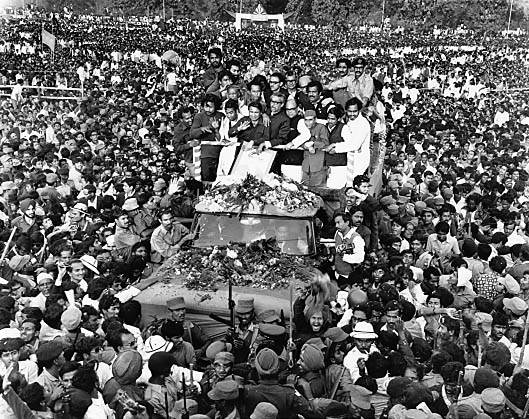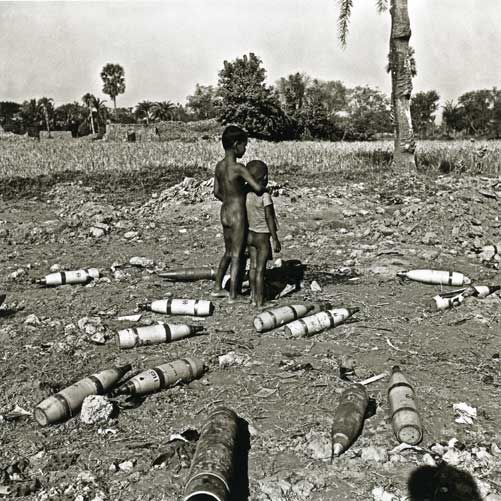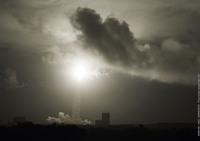CHITTAGONG, Bangladesh — Sure, the shipping distance from Japan to this sprawling industrial park might be great, and his trucks must sometimes compete with rickshaws and livestock on the crowded roads outside its walls.
 |
| Freighters AWAIT loading and unloading in Bangladesh's main port of Chittagong. At right, an employee of Sanko Optical Co. (BD) holds up an optical lens made for export at the company's plant in the Chittagong Export Processing Zone last month. ERIC PRIDEAUX PHOTOS |
 |
|
But overall, Yasufumi Matsuo, executive director at Japanese electronic parts maker Op-Seed Co.'s factory in Chittagong, is happy with conditions at the Export Processing Zone here in Bangladesh's main port town, where local workers at his plant manufacture buttons and light-emitting diode displays used in vending machines assembled back in Japan.
"They make good products," said Matsuo, who has run the plant for a decade. While he wants improvements in water supply and, to reduce downtime, electricity generation, his 1,200 workers get the job done well, he said. "They hold their own against workers in China and Thailand."
Despite years of corruption that hindered growth by, for example, snarling maritime traffic at Chittagong, Bangladeshi business conditions are improving. Bangladeshi leaders want Japan to invest more in their domestic businesses and consume more exports, saying Bangladesh now has a competitive edge over China as a key economic partner.
In a country with per capita gross domestic product of $1,400 (¥151,000), compared to $33,800 (¥3.7 million), in Japan, building those ties is a priority.
Not that this country of 150.4 million mostly Muslims has been languishing. Annual growth has averaged 5.6 percent over the past 10 years, with last year's rate of 6.7 the highest-ever. A top government official believes that despite November's catastrophic cyclone Sidr, growth this year will hover around a respectable 6.0 percent — above the world average.
"What frustrates me is that we could have touched 8, 8.5 percent (growth) easily" had there been cleaner politics in the land, remarked well-known leather-goods and pharmaceuticals businessman Syed Manzur Elahi, who serves as administrator at the Federation of Bangladesh Chambers of Commerce and Industry.
Elahi is not alone in issuing bold claims. According to a 2000 report for the World Bank titled "Estimating the Effects of Corruption Implications for Bangladesh," if the country had reduced corruption "to levels existing in transition economies like Poland," growth in 1990-97 could have risen by more than half.
Real growth of 8.5 percent would put Bangladesh on the same economic trajectory as India, with which it shares a long border, and well on the way to China's 10.5 percent. But as long as it was business as usual at Chittagong in Bangladesh's southeast, near the border with Myanmar, Bangladeshi manufacturers could not hope to be competitive on a global scale.
Port authorities demanded "speed money," or bribes, before letting goods pass. And even when officials' palms had been duly greased, other miscellaneous port delays made it difficult for Bangladeshi companies to complete overseas orders in fewer than 90 days — twice the time needed in No. 1 competitor China, Elahi said.
This began to change after leaders responded to an outbreak of political unrest by imposing a state of emergency on Jan. 11, 2007. An interim government assumed power, arresting scores of politicians and businessmen suspected of shady dealings.
Some Bangladeshis have grumbled about the state of emergency because elections have been suspended until this December. But by slashing red tape the political deep freeze has allowed the caretaker government to cut ships' waiting time at Chittagong by some 70 percent to four days, giving domestic manufacturers a new edge on such big competitors as China, Elahi said.
Foreign manufacturers still worry about Bangladesh's underdeveloped infrastructure, but the Bangladesh Export Processing Zone Authority is trying to put their concerns to rest.
For example, at the processing zone in South Halishahar, Chittagong, where Japan's Op-Seed has its plant, there are plans to put 50 megawatts of new power generation online in September, expand treatment of water waste and beef up high-speed communications networks to enable video conferencing between the eight Export Processing Zones and overseas offices.
Meanwhile, officials said monthly worker wages of some $30 make Bangladesh more competitive than their counterparts in Vietnam, where they said wages were $80, or China, where wages reach $100. The comfortable business environment has attracted manufacturers supplying parts to such blue-chip Japanese companies as Minolta, Sony and Nissan, according to BEPZA.
Removing obstacles to exports at home is one thing, but another important challenge for Bangladesh is to diversify its overseas markets for woven garments and knitwear, which together account for about three-fourths of exports, and other products such as frozen shrimp, leather and goods made of the vegetable fiber jute. Just over half go to the European Union, while about a third travel to the Americas.
On the other hand, Bangladeshi trade officials say Japan, the world's second-largest economy, absorbs only about 2 percent of exports partly because of stringent requirements to document that goods originated in Bangladesh.
Also, Bangladeshi officials say Japan sets higher quality standards than large Western buyers, making it uneconomical to build relationships with Japan until larger demand emerges.
"Why should I take the extra botheration of having a fully air-conditioned factory for exporting to Japan and the amount of the export order is only $10,000? It's not feasible," said Faridul Hassan, director general at the Ministry of Commerce's Export Promotion Bureau, speaking as a hypothetical exporter slapped with higher requirements to refrigerate export goods.
Conditions are beginning to change, however, as rising labor costs in China, Japan's largest trading partner, will compel China to up its export prices, Bangladeshi trade officials say.
"Our price is quite competitive in comparison to China and the rest of the world," said Shahab Ullah, vice chairman of the Export Promotion Bureau. "There is a growing realization among Japanese policymakers that there has to be China, plus one country. They're looking for it."
An encouraging sign came during a Bangladeshi trade fair in Japan one year ago. On display were a dozen or so products, including ceramics, ready-made garments, textiles, leather products and jute goods.
Japanese visitors were impressed by the quality, Ullah said. For one, there were immediate "spot" orders worth about $1 million and potential orders twice that value, he said, adding that many of the relationships forged that day have taken root.
"Our commodities are coming up," Ullah said. "A serious market is in the process of being opened."












 The New York Times reviews a book called Eat This, Not That!, a nutrition guide full of images of foods you shouldn't eat and their healthier substitutes. The book also has a section highlighting 20 of the country's worst foods, and the article republishes eight of them, categorized with names like "worst fast food meal" and "worst drink". The "winners"?
The New York Times reviews a book called Eat This, Not That!, a nutrition guide full of images of foods you shouldn't eat and their healthier substitutes. The book also has a section highlighting 20 of the country's worst foods, and the article republishes eight of them, categorized with names like "worst fast food meal" and "worst drink". The "winners"?

























